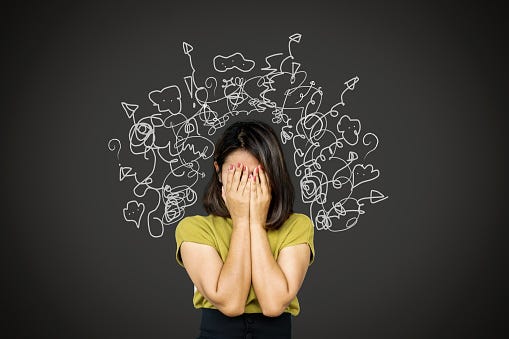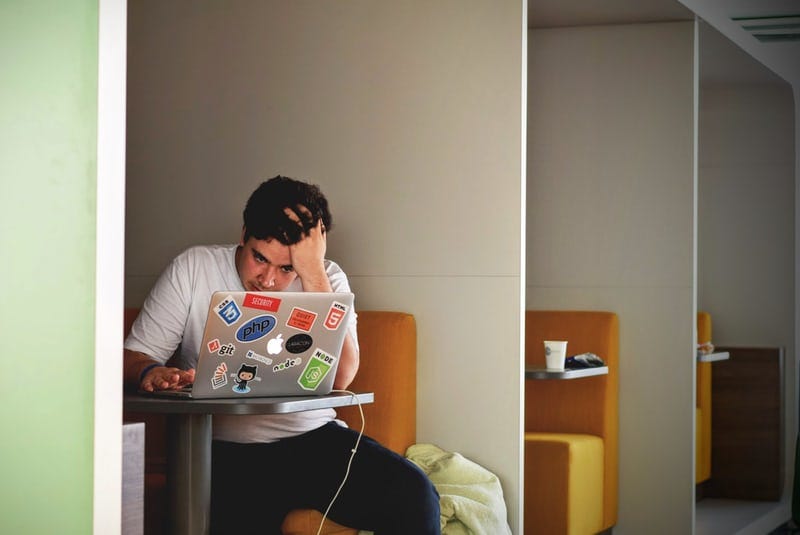This month the U.S. Michigan Consumer Sentiment Report found Americans are the most stressed in 11 years.
Last week, The American Psychological Association reported the results of their Stress in America survey indicating worries around Russia’s invasion of Ukraine and uncertainty with inflation are most alarming.
This is a tumultuous time in the markets, especially coming off of a banner year of record highs with virtually everything, including in the virtual world.
With over 1k SPACs and IPO listings, hundreds of billions plowed into seed-stage investments in the VC and PE space, meme and retail trading taking off, and most notably, the influx of millions of new investors into the market, 2020–2021 are for sure in the record books in and out of the market.
All this exuberance, pent-up demand, and froth paved its way into above-average territory. It was hard not to earn at least a 5% return last year unless you were hedge funds who shorted unprofitable companies such as AMC and Blackberry which should make sense since these companies were already plummeting due to immense competition and penetration, demand, and lack of profitability for years. Yet low and behold, the mighty retail investors ganged up on them and engaged in a short squeeze. Sounds like a fantasy. Ha, because it was!
Coming into this year our expectations were audacious. We expected the economy’s troubles with the supply chain and inflation would abate as soon as the Fed hiked rates and the year would start off more mellow but not in total correction and bear market territory with fears of stagflation and now a possible recession. Although there’s a 20% chance a recession will happen according to BofA due to oil spikes and slower economic growth, the Fed has a lot in its power to make sure its proposed 4 rate hikes at 25 basis points will cool off inflation and slow resilient consumer’s balance sheets instead of pulling the cord and dipping into a recession.
From an investment standpoint, there’s a lot you can worry about. But be mindful. You CAN choose or HAVE To worry about what’s not in your control. Geopolitical risks within emerging markets aren’t systematic risks. They can be diversified away. Alongside having a sizable emergency savings fund with 6–12 months to cover living expenses is essential to stay afloat and also have cash on the sidelines in case you want to buy every day at the dip. Just make sure your brokerage doesn’t charge any commission fees or expenses ratios to make those trades or else you’ll be burning more than earning these days.
With over ~56% of Americans who buy on margin (borrow money from their brokerage to buy stock using their investments as collateral) should be focused on paying off as much debt as possible now before interest rates hike. The FFR doesn’t affect mortgage rates as much as we think since mortgage rates follow the 10-year Treasury bond yield.
If you are locked into a fixed 30-year mortgage, that will save you the most interest over time and you are more than likely to also pay off that mortgage earlier yet you’ll have fewer cahs on the side to invest in the deep discounts.
Also, just because our purchasing power is expected to rise higher with the Fed’s hikes, doesn’t mean savings rates, currently paying around 0.06% will go up. Banks tend to lag on raising deposit rates, not following the Fed’s actions right away. Although that’s frustrating and another reason to unfollow ‘cash is king’, it is the best strategy to keep you sane and have peace of mind during these tumultuous times.
We may not have control over companies’ earnings, the tight labor market, supply chain constraints, or hyperinflation, but we can do the most powerful thing: save more than we earn, diversify, never be reliant on one thing, and have a backup since things happen in life!
After all, what’s certain is uncertainty, even our feelings.
Have I scared you already?
Don’t be. You aren’t alone. It’s riskier to not invest than to invest since the broader markets do go up over time. Look at the bigger picture to save your time, money, and sanity, your most precious assets.

Anxiety Addiction
As a college student, I hear the terms anxiety, anxiousness, and angst thrown around constantly. Now it’s just a way of saying you are slightly uncomfortable. If you were to define anxiety, most people would say nervousness and fear of the unknown. Yet making assumptions and declaring you have anxiety can be the most frustrating thing to someone who is seriously struggling through it.
Don’t take it lightly. Thankfully, I was able to overcome my anxiousness about virtually everything pre-pandemic and now feel elated to get back out there and seize every opportunity to practice it.
The best advice I’ve ever been given on how to treat anxiety is to treat it as excitement. From eating to investing, moderation is key in everything, especially with our feelings. Feel what you need to feel but once it gets overblown, it will hurt more than heal you.
Feeling anxious means you are anticipating something. This is a good thing becuase you want to be prepared yet in this age of mental health awareness and self-help, it sells so well to the point that everyone is declaring they are nationally anxious and don’t even know what they mean.
To be clear, everyone has a reason to feel the way they are feeling. Don’t let them go. If you push them away, they will only multiply later on, similar to procrastination. It feels good to hide it under the rug until it smacks you in the face before something is due the next day.
So save yourself by focusing on what you can control. This is beyond the markets and now in life. Rerouting your attention and mindset is essential and something the wealthiest countries, partially the US and Australia.
Why is that? We have a reason for feeling anxious, nervous, and fearful but in retrospect, it is a first-world problem.

Richest Nervousness
Our problems, feelings, and troubles are real and should be acknowledged but most of our problems in the U.S. aren’t life or death. With anxiety, it’s easier to live your normal daily life than get away with it while chasing a bear or fighting for your country.
In the U.S., our fears tend to stem from our own faulty actions, no one else’s. It can be due to laziness for not paying the bills on time, not keeping in touch with people, not planning for the future such as setting up a will or trust in dividing your assets, or as simple as not getting up early in the morning to tackle what needs to get done.
These acts of short term gratification delay our pleasure later on and naturally make us more anxious. It’s in our control ot feel this way but we tend to blame it on anxiety because we can. Now certainly not all of our problems can be washed away and aren’t in our control. But on average in wealthier countries, people tend to find excuses to be anxious such as within the markets, sports gambling, events, travel plans because they sometimes choose to.
This clearly doesn’t translate well in the markets. Panic selling when a stock goes down and buying it when it goes up is not a plan. It is the danger zone.
At this time, many are feeling helpless during the invasion of Ukraine because we relate to them more. There have been wars, famine, poverty, and destruction throughout the ages across the world in war-torn-countries yet when we see people that wear what we wear, drive what we drive, and eat what we eat, we find similarities and sympathize.

United States of Anxiety
Anxiety isn’t something we should run away from since to an extent it is beneficial.
Wealthier nations report only slightly happier levels of bliss than lower income countries despite incredible innovation, wealth, opportunities, progress, communities, safety, etc.
Why is that so?
The racial, wealth, pay divide, prices, high stakes, and competition can drive us insane. We never feel enough and always strive to keep up with the Joneses across the street.
At least we have Gen Zers (myself) to bring back the ethos of buying experiences not materials! Clearly, not everyone has adopted that mindset yet.
In wealthier countries, anxiety is more prevalent amongst those with lower levels of education and income and is more likely to affect women and the disabled.
Compared to war-torn nations, people who deal with mental health issues are less likely to report feeling it since they aren’t ‘lucky’ or have the opportunity to be as anxious according to Dr. Judson Brewer, an associate professor at Brown University.
A 2017 study in JAMA Psychiatry, which used World Health Organization data collected from nearly 150,000 adults in 26 countries, found that generalized anxiety is far more common and more disabling among people in wealthy countries.
I’m sure we all know someone, possibly ourselves that always tends to be in an anxious state. I used to be this way and it took a toll on my physical health. I always felt groggy and with brain fog until I realized that its all in my mind.
The data indicated that the lifetime prevalence of generalized anxiety disorder affected less than 1% of the population in Nigeria and China but showed up in 8% of adults in the US and in Australia. As a result, anxiety disorder affected 5% of people in high-income countries, 2.8% in middle-income nations, and 1.6% in low-income countries.
Picture this, if you are running away from a bear, being anxious will make it more difficult to survive and listen to your first instincts on where to run. As a safety mechanism, we need to be on alert through fight or flight but in the right way that our fears aren’t ruling us, or else we will stay still and get eaten.
Does this mean the wealthy are more sympathetic since they are generally more anxious about everything and everyone?
On average, wealthier people tend to be happier, more sympathetic, and gracious. Not with their time per se since they cherish it the most but with their money, unless you aren’t an anonymous donor for that obvious reason. This is an average so don’t bark at me. There are generous and cruel people from all income classes and groups that stash and or give freely their funds. It depends mostly on your background and personality.
Those who have been triggered by anxiety, small or large must realize that nothing lasts forever. It may seem pointless to know that today since we must live in the present, but at the same time, uncertainty will always prevail.
Constantly checking in with the news or markets when you don’t have answers may cause more bouts of anxiousness to flare especially since no one has a crystal ball. When you think about your sources of anxiety you can better understand why you connect with the Ukrain people or why 2022’s stock market dip is affecting you more than the dot-com bubble, 08 Housing Crisis, and brief recession in Feb-March 2020 combined.
For my generation, Gen Z who’ve never experienced a full-on bull market, this is certainly an alarming time simply because it is unknown. Change is scary for all but it doesn’t mean we aren’t ready. Control what you can and let the rest go. Just like being busy isn’t a badge of honor, declaring you are stressed to show off or for some other egotistical motive is crazy.
Understand your triggers and seek support through counseling and even give back through donations. The best gift is giving. It pays dividends right back.
What you are feeling is valid. Don’t shy away from it. Instead understand the bigger picture, long-term view, and take control of it before it controls you.

